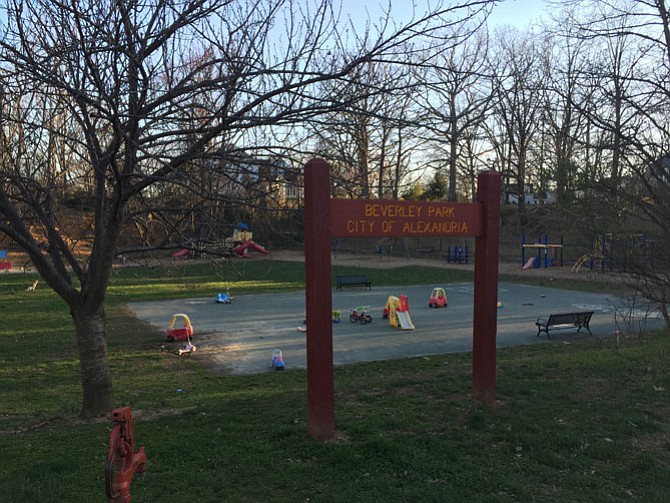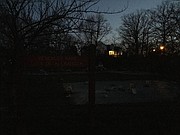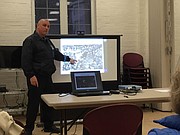Beverley Park at dusk. Photo by Vernon Miles.
Beverley Park is a fairly inconspicuous park at the heart of one of Alexandria’s northern residential neighborhoods, but locally it has a somewhat more ominous name: the Pit. The steep walls around the park, the thick hedge, and the lack of lighting had not been issues of urgent concern, but all of that changed on Nov. 9 last year when the body of Jose Luis Ferman Perez was discovered at the playground. Perez, 24, was murdered, and as the city begins to prosecute his alleged killers, residents near the park and city staff begin the work on repairing the site’s security problems.
“I don’t like the idea of lights here, it could snowball into something the community doesn’t want.”
— Charles Lloyd, crime prevention specialist for the Alexandria Police Department
On March 21 in the Beverley Hills Methodist Church, just a few blocks away from Beverley Park, a few local residents met with Judy Lo from the Department of Parks, Recreation and Cultural Activities. The meeting was a follow up to a more widely attended meeting earlier in March. The main topic at both meetings was park safety, with park lighting as the centerpiece. Questions had been raised about whether to go with a duller series of lights along a pathway or a few taller, more brightly lit outposts.
But at the March 21 meeting, Alexandria Police Department crime prevention specialist Charles Lloyd proposed another alternative: no lights.
The local residents were skeptical, but Lloyd said that lighting the park at night could have some surprising detriments to the neighborhood. Lloyd studies crime prevention through environmental design, and noted that the park design is inherently poor for public safety.
“Natural surveillance is big,” said Lloyd. “Can the casual observer see all of the park? At Beverley Park, they can’t.”
The park has several things things that could make it an appealing place to commit a murder or hide a body, but Lloyd said natural surveillance is a bigger problem than the lighting. The sharp inclines around the park, from which it gets its nickname, block views from adjacent streets. In an ideal world, Lloyd said the park would be raised to the same grade as the street, but acknowledged that the solution would be infeasible. The playground equipment, however, is being elevated to street-grade in the Parks Department plans.
Even along the main road, N. Overlook Drive, a thick hedge of bushes and low trees entirely hides the park except for two gaps at the north corners. The park plans call for the removal of the hedge to be replaced with a taller tree canopy that offers a more open view of the park.
Another problem, according to Lloyd, is the location of the playground equipment. The equipment is too far pushed back from the main street and offers too many hidden corners for people to hide in.
“People will loiter and you can’t see them,” said Lloyd, “no matter what kind of lighting you have.”
Lloyd advised that the playground equipment should be relocated closer to the street and have more transparent equipment. Lo said that the new playground won’t have as many obstructions and that it is being shifted closer to the grassy area of the park, away from the walls of the Pit.
One of the other security concerns at the park is that the only entrance and exit to the park is along the north wall.
“If you’re in the back of the park, you’re really stuck back there,” said Lloyd. Lo said some of the park plans include alternative egresses into the park.
But on the major topic of the night, lighting, Lloyd cautioned that it could accidentally turn their relatively anonymous park into a city-wide attraction for Alexandrians out after dark.
“The problem with illumination is that it attracts people,” said Lloyd. “It’ll attract teenagers, and we can’t enforce the law sporadically. If we get called to the park for a disturbance, we’ll have to kick everyone out.”
Lloyd recalled, from his own experiences, that kids looking to play football at night would sometimes fill up tennis courts because they were lit at night. With a wide grassy field at Beverley Park, all it needs is that lighting to become a hotbed for late night sports enthusiasts and restless teens. When some of the residents began saying that they wouldn’t want to be “that neighbor,” the one that calls the police on their neighbor’s children playing in the park, Lloyd added that the assumption that anyone playing on the equipment at night is local could be dangerous as well. If no one calls the police when they see people lurking around the park at night, that only attracts more unsavory characters to the park, and the lighting once again is self-defeating.
Across Alexandria, Lloyd said park and trail lighting needs to be evaluated on a case-by-case basis. Holmes Run Park, for example, should not be lit, Lloyd said.
“At night, [lighting] invites people in, and there are too many dark areas off to the side of the path.”
But parks near the Metro, for instance, should be lit, because people use the park at night whether it’s lit or not, he said.
“There’s a lot of things to consider,” said Lloyd, and expressed sympathy for the difficult situation local residents faced. “Having something like this done in your park, I couldn’t imagine what that’s like … but we don’t want a knee-jerk reaction. … I don’t like the idea of lights here, it could snowball into something the community doesn’t want.”
Lloyd and local residents agreed that crime issues with the park have been virtually non-existent aside from the murder. Some noted that during park cleanups it wasn’t uncommon to find discarded beer cans, and the night of the meeting the area around the entrance of the park reeked of marijuana. Still, the residents at the meeting agreed that the lighting’s detriments were more trouble than it was worth.
When it came time for local residents to vote on a plan, nearly all of them supported not lighting Beverley Park.
“That’s about as unanimous as you’ll get at any civic association,” said Bruce Johnson, former President of the Northridge Citizens’ Association. Lo said the Parks Department plans to submit plans to City Council in March for approval by the Planning Commission and City Council in June, with construction beginning in fall of 2016


